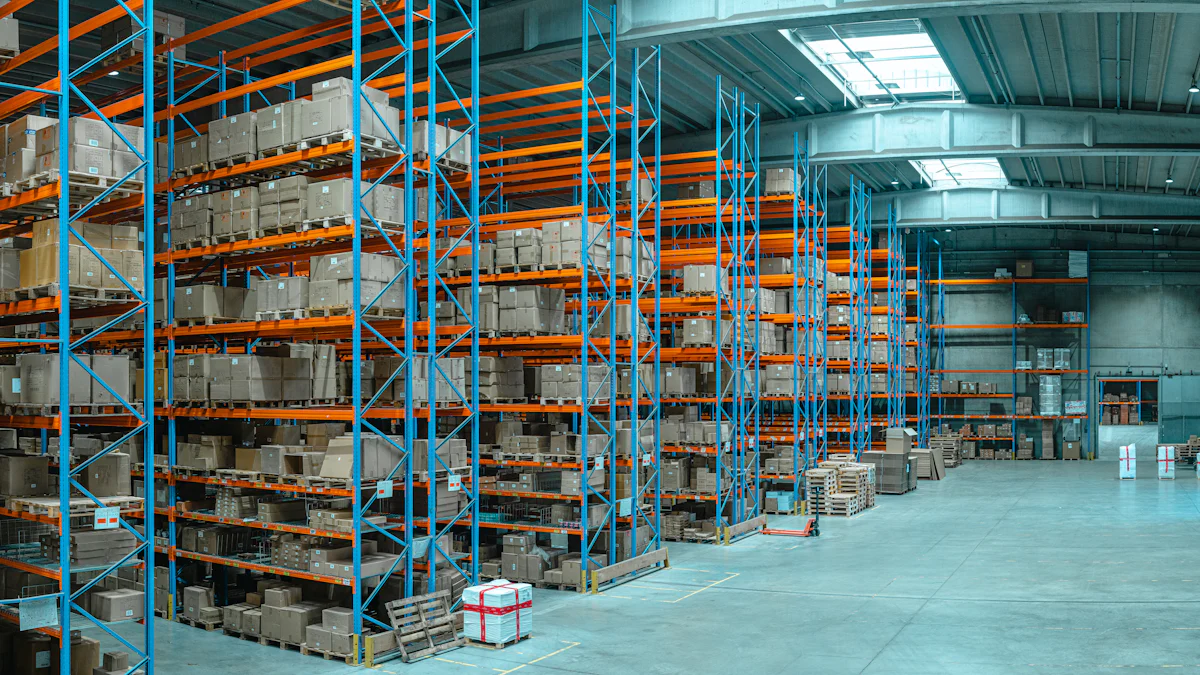Logistics Planner Brainworks: A Path to Success

Logistics planner brainworks involve the mental processes and strategies you use in logistics planning. These brainworks are crucial for success. They help you manage geographically dispersed hubs, monitor suppliers, and ensure cost-effective deliveries. According to the Harvard Business Review, poor execution leads to the failure of 67% of business strategies. Effective logistics planner brainworks can significantly improve your on-time delivery rates, ranging from 78% to 90%. By mastering these skills, you enhance your ability to execute successful logistics strategies.
Key Takeaways
Mastering logistics planner brainworks enhances your ability to manage complex logistics operations effectively.
Improving cognitive processes and strategic thinking can significantly boost your decision-making accuracy and operational efficiency.
Embrace continuous learning to stay updated with the latest trends and technologies in logistics, positioning yourself as a leader in the field.
Utilize advanced tools like the JusLink Platform to optimize logistics operations and enhance resource management.
Implement techniques such as mind mapping and scenario planning to foster creativity and prepare for uncertainties in logistics.
Focus on reducing costs and improving productivity through effective resource allocation and analytical thinking.
Enhancing customer satisfaction through timely and accurate deliveries can lead to increased loyalty and competitive advantage.
Understanding Logistics Planner Brainworks
Definition and Components
Logistics planner brainworks involve a set of mental processes and strategies that you use to manage logistics effectively. These brainworks consist of two main components: cognitive processes and strategic thinking.
Cognitive Processes
Cognitive processes play a crucial role in logistics planning. They include perception, memory, and decision-making. You rely on these processes to analyze data, predict outcomes, and make informed decisions. Studies have shown that cognitive biases can influence decision-making in logistics, often leading to less rational choices than models assume. By understanding and mitigating these biases, you can improve your decision-making accuracy.
Strategic Thinking
Strategic thinking involves planning and executing logistics operations with a long-term perspective. It requires you to anticipate challenges, allocate resources efficiently, and adapt to changing circumstances. Strategic thinking enables you to create robust logistics plans that align with your organization's goals. This component is essential for navigating complex logistics networks, especially in international logistics, where diverse regulations and market dynamics come into play.
Importance in Logistics Planning
The importance of logistics planner brainworks cannot be overstated. They enhance efficiency and reduce costs, two critical factors in successful logistics management.
Enhancing Efficiency
Efficient logistics planning ensures that resources are used optimally, reducing waste and improving productivity. By employing effective brainworks, you can streamline operations, minimize delays, and ensure timely deliveries. This efficiency is particularly vital in international logistics, where coordination across borders and time zones presents unique challenges.
Reducing Costs
Cost reduction is a primary goal in logistics planning. Effective brainworks help you identify cost-saving opportunities, such as optimizing transportation routes and consolidating shipments. By reducing unnecessary expenses, you can increase your organization's profitability and competitiveness. In the realm of international logistics, cost management becomes even more crucial due to the complexities of cross-border trade.
Key Skills and Techniques in Logistics Planner Brainworks

Essential Skills
Analytical Thinking
You need analytical thinking to excel in logistics planning. This skill allows you to break down complex problems into manageable parts. By analyzing data, you can identify patterns and trends that inform your decisions. For instance, logical reasoning helps you systematically evaluate situations, anticipate potential issues, and make informed choices. This approach enhances your problem-solving skills and improves the effectiveness of your logistical plans. Analytical thinking also involves conducting cost-benefit analyses and assessing long-term financial feasibility. These evaluations ensure that your decisions lead to sustainable operations.
Problem-Solving
Problem-solving is another critical skill for logistics planners. You must tackle challenges that arise in the supply chain, such as delays or unexpected costs. By employing logical reasoning, you can assess risks and develop contingency plans. This involves evaluating the likelihood of delays, damage to goods, or unforeseen expenses. Prioritizing risks based on their potential impact allows you to choose paths that balance benefits with acceptable risk levels. Additionally, monitoring competitors' moves as part of your risk analysis helps you provide cost-effective solutions to customers.
Effective Techniques
Time Management
Effective time management is crucial in logistics planning. You need to ensure that all operations run smoothly and on schedule. By prioritizing tasks and setting clear deadlines, you can optimize your workflow. This technique minimizes delays and enhances productivity. Time management also involves coordinating schedules across different regions and time zones, especially in international logistics. Streamlining these processes ensures timely deliveries and improves overall efficiency.
Resource Allocation
Resource allocation is essential for optimizing logistics operations. You must allocate resources efficiently to reduce waste and improve productivity. This involves identifying cost-saving opportunities, such as optimizing transportation routes and consolidating shipments. By managing resources effectively, you can increase your organization's profitability and competitiveness. Resource allocation also requires you to develop business tools and solutions based on product knowledge. Identifying logistics process improvements further enhances your ability to manage resources effectively.
Benefits of Effective Logistics Planning with JUSDA

Operational Advantages
Improved Productivity
You can significantly boost productivity by leveraging JUSDA's logistics solutions. JUSDA utilizes cutting-edge technology to provide real-time insights into your supply chain. This visibility allows you to streamline operations, ensuring that resources are used efficiently. With a clear view of your entire logistics network, you can make informed decisions quickly, reducing delays and enhancing workflow. The integration of advanced technologies like IoT and cloud platforms further optimizes your logistics processes, leading to increased productivity.
Enhanced Customer Satisfaction
Effective logistics planning with JUSDA enhances customer satisfaction. By ensuring timely and accurate deliveries, you meet customer expectations consistently. JUSDA's comprehensive distribution solutions facilitate a seamless flow from raw material procurement to the delivery of finished products. This efficiency in distribution minimizes errors and delays, resulting in a positive customer experience. When customers receive their orders on time and in perfect condition, their satisfaction and loyalty to your brand increase.
Strategic Benefits
Competitive Edge
JUSDA's logistics services give you a competitive edge in the market. By utilizing lean supply chain management, you can reduce costs and improve efficiency. This approach allows you to offer competitive pricing and better service to your customers. The use of big data analytics helps you anticipate market trends and adjust your strategies accordingly. Staying ahead of competitors becomes easier when you have access to real-time data and insights, enabling you to make proactive decisions.
Long-term Sustainability
Long-term sustainability is achievable through effective logistics planning with JUSDA. By optimizing your supply chain, you reduce waste and improve resource utilization. This not only lowers costs but also minimizes your environmental impact. JUSDA's focus on sustainable logistics practices ensures that your operations align with global sustainability goals. By adopting these practices, you contribute to a more sustainable future while maintaining profitability and competitiveness.
Practical Strategies for Success with JusLink
Developing Logistics Planning Skills
Continuous Learning
To excel in logistics, you must embrace continuous learning. The logistics landscape constantly evolves, requiring you to stay updated with the latest trends and technologies. Engaging in workshops, attending seminars, and pursuing relevant certifications can enhance your knowledge and skills. By doing so, you position yourself as a leader in logistics operations, capable of navigating complex global supply chains. Continuous learning not only boosts your expertise but also prepares you for leadership roles within your organization.
Leveraging Technology
Technology plays a pivotal role in modern logistics. By leveraging advanced tools like the JusLink Platform, you can optimize your logistics operations. JusLink offers real-time data access, enabling precise decision-making and efficient resource management. Its user-friendly interface ensures seamless integration into your business processes. By utilizing JusLink, you enhance your ability to manage end-to-end operations effectively, reducing waste and improving efficiency. Embracing technology positions you as a forward-thinking leader in the logistics industry.
Enhancing Brainworks
Mind Mapping
Mind mapping is a powerful technique to enhance your logistics brainworks. It involves visually organizing information, helping you see connections and relationships between different elements of your logistics operations. By creating mind maps, you can plan more effectively, identify potential challenges, and develop strategic solutions. This technique fosters creativity and innovation, essential qualities for leadership in logistics. Mind mapping enables you to approach logistics planning with a fresh perspective, leading to more efficient and effective operations.
Scenario Planning
Scenario planning prepares you for uncertainties in logistics. By envisioning different scenarios, you can anticipate potential disruptions and develop contingency plans. This proactive approach enhances your ability to manage risks and maintain smooth operations. Scenario planning involves analyzing various factors that could impact your logistics, such as changes in regulations or market dynamics. By preparing for different outcomes, you strengthen your leadership capabilities and ensure your business remains resilient in the face of challenges.
In this blog, you explored the critical role of logistics planner brainworks in achieving success. You learned about the importance of cognitive processes and strategic thinking in logistics planning. By enhancing your skills in analytical thinking and problem-solving, you can optimize operations and tackle complex challenges effectively. Leveraging technology and continuous learning further strengthens your logistics capabilities. Remember, logical reasoning is crucial for decision-making and problem-solving. It enhances the effectiveness of your logistical plans. By mastering these elements, you position yourself for success in the dynamic world of logistics.
See Also
Innovative Logistics Technologies Shaping Tomorrow's Landscape
Mastering Lean Logistics for Advanced Manufacturing Triumph
Exploring Future Supply Chains for Professional Advancement
Boosting Warehouse Efficiency with Logistics Robotics Innovations
Unlocking Cost Savings: Expert Tips for Supply Chain Optimization
